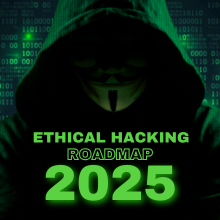
How to Become an Ethical Hacker in 2025- A Comprehensive Roadmap
"Discover a detailed roadmap to becoming an ethical hacker in 2025. Learn about the skills, certifications, and career opportunities to excel in this dynamic field."
How to Become an Ethical Hacker in 2025: A Comprehensive Roadmap

Starting your career in ethical hacking can be greatly supported by taking Ethical hacking Courses. However, there are also other paths to explore. This guide covers all you need to know to begin your journey as an ethical hacker.
What is Ethical Hacking?
Ethical Hacking involves using hacking techniques to assess the security of computer systems and networks. Ethical hackers identify weaknesses in systems that malicious hackers might exploit. This practice is also referred to as penetration testing, white-hat hacking, or security testing.
Unlike malicious hackers, ethical hackers do not try to access systems or data without permission. Instead, they work to enhance security by finding and fixing vulnerabilities before they can be exploited. Ethical hacking can be applied to everything from small networks to large enterprise systems.
Ethical hackers utilize various tools and methods to uncover security flaws, including port scanning, web application attacks, and database attacks. By identifying and addressing these vulnerabilities early, ethical hackers help organizations strengthen their defense mechanisms against cyber threats.
Upskill Yourself With Live Training Programs:
- One-year Diploma Program in cybersecurity
- Six Months Certification Course in cybersecurity
- Six months Diploma program in Cyber Forensics
- 45 Days Certification Course in Ethical Hacking
Role of an Ethical Hacker
To understand how to become an ethical hacker in India, it's important to know who they are. Ethical hackers, also known as white-hat hackers, use their skills to identify security weaknesses in systems and networks. They then work with the system owners to fix these vulnerabilities before malicious hackers can exploit them.
Many ethical hackers work as consultants, providing cybersecurity expertise to companies. Others may work for government agencies or private organizations. Ethical hackers use the same techniques as malicious hackers but with the permission of the system owners to test their systems.
Ethical hacking is all about helping organizations improve security by finding weaknesses and fixing them before they can be exploited. Ethical hackers may also be hired to test an organizationʼs defenses against social engineering attacks, such as phishing.
Types of Ethical Hackers
Hacking involves solving technical problems using computers, networks, or other resources. Not all hackers follow ethical guidelines. Here's a breakdown of the different types:
-
White Hat Hackers:
White hat hackers, or ethical hackers, work as cybersecurity experts helping governments and businesses by performing penetration testing and identifying security flaws. They use various techniques to protect systems from cybercriminals and work to remove vulnerabilities, viruses, and malware.
-
Black Hat Hackers:
Black hat hackers are the main perpetrators of cybercrime. These hackers look for flaws in computer systems, banking systems, and businesses to exploit them for financial gain, often accessing sensitive data like personal and business information.
-
Grey Hat Hackers:
Grey hat hackers fall somewhere between white and black hat hackers. They might not use their skills for personal gain but can have mixed intentions. For example, a hacker might discover a vulnerability and either leak it publicly or report it to the organization. If they use their skills for personal gain, they become black hat hackers.
Types of Cyber Attacks
Ethical hackers must understand common cyber threats:
- Malware: Malware includes malicious software like viruses, ransomware, spyware, and worms. It usually enters a system when a user clicks on a harmful link or email attachment. Once inside, malware can block access to system components, steal information, install additional harmful software, or disable systems.
- Phishing: Phishing involves sending fraudulent communications that appear to come from trusted sources, usually through email. These messages aim to steal sensitive data, like credit card information or login credentials, or to install malware on the victim's device.
- Man-in-the-Middle Attacks: In a man-in-the-middle (MITM) attack, hackers intercept and alter communications between two parties. Common attack methods involve intercepting traffic on insecure public Wi-Fi networks or installing software to process the victimʼs data after a breach.
- Denial-of-Service Attacks: These attacks overwhelm a server or network with excessive traffic, exhausting resources and making it impossible to fulfill legitimate requests. Distributed denial-of-service (DDoS) attacks use multiple compromised devices to flood a target.
- SQL Injection: SQL injection occurs when a hacker inserts malicious SQL code into a vulnerable websiteʼs input fields, forcing the database to reveal data it would normally protect.
- Zero-Day Exploits: Zero-day attacks exploit vulnerabilities before the software vendor has had a chance to release a fix, making it essential to stay updated with security patches.
- DNS Tunneling: DNS tunneling allows non-DNS traffic to pass through the DNS protocol, making malicious data appear as regular DNS traffic. Itʼs used to exfiltrate information or command malware on a compromised system.
Why Choose Ethical Hacking as a Career?
In today's digital world, cybersecurity is a critical concern for both individuals and businesses. As the digital landscape expands, so does the need for professionals who can protect systems from cyber threats. Some reasons to consider a career in ethical hacking include:
- High demand for cybersecurity professionals across both public and private sectors.
- Cybersecurity is no longer confined to the digital realm but extends into physical security as well, making the field more impactful.
- A booming job market where an Online Ethical Hacking Course can significantly increase your salary potential.
- Opportunities to work with leading brands and expand your network in the cybersecurity community.
Roadmap to Becoming an Ethical Hacker
Hereʼs a step-by-step guide to becoming an ethical hacker in India:
1. Knowledge of Computer Systems and Networks
Understand how computer systems work, including network protocols, operating systems, and how components interact in a connected environment.
2. Proficiency in Programming Languages
Learn programming languages like Python, C, Java, JavaScript, SQL, Perl, and Ruby to develop the skills needed for hacking.
3. Networking and Security Concepts
Familiarize yourself with networking principles and security protocols to understand how data is transmitted, secured, and protected.
4. Web Application and Database Knowledge
Learn about web application architecture and common vulnerabilities like SQL injection, XSS, and CSRF.
5. Expertise in Operating Systems
Master operating systems such as Windows, Linux, and macOS to understand their configurations, permissions, and security features.
6. Familiarity with Ethical Hacking Tools
Learn to use tools like Metasploit, Wireshark, Nmap, Burp Suite, and Kali Linux for penetration testing and vulnerability analysis.
7. Problem-Solving and Analytical Thinking
Ethical hackers must be excellent problem solvers with strong analytical skills to assess systems and identify risks.
8. Understanding of Attack Vectors
Learn about the various attack vectors, such as social engineering and password cracking, to help prevent them.
9. Certifications
Obtaining certifications in Online Ethical Hacking Course validates your skills and enhances your job prospects.
Tips for Aspiring Ethical Hackers
Along with formal education, aspiring ethical hackers should:
- Learn programming, tools, and operating systems like C, Kali Linux, and Python.
- Master the art of online anonymity.- Stay updated on cybersecurity trends and technologies.
- Build a solid understanding of networking concepts.
- Explore the deep web and understand cryptography.
- Practice by exploiting system vulnerabilities and countermeasures.
- Study case studies of cyber attacks to understand tactics and techniques.
- Keep up with the latest trends and technologies in cybersecurity.
Eligibility to Become an Ethical Hacker
Educational Qualifications:
- Complete 102 or equivalent from a recognized board.
- Obtain a minimum score of 50% in 102 exams.
- Some institutions require entrance exams for admission.
Required Skills:
- Strong programming and security analysis skills.
- Ability to research and think critically.
- Systemization, problem-solving, and analytical thinking skills.
- Practical, hands-on approach to cybersecurity.
Career in Ethical Hacking
Being an ethical hacker is both exciting and challenging. Ethical hackers work across various organizations, identifying and neutralizing threats. They utilize their advanced technical skills to penetrate systems and protect sensitive information from cybercriminals. A Career in Ethical Hacking offers the opportunity to make a significant impact on cybersecurity while continuously learning and growing in a dynamic field.
As the demand for ethical hackers grows, qualified professionals can find job opportunities in:
- Security Consultant
- Security Auditing
- Network Architect
- Technical Support
- Security Administrator
- Systems Analyst
Demand for Ethical Hackers in 2025
With the rise in cyber threats, the demand for ethical hackers is on the rise. Companies are expanding their digital presence and need ethical hackers to ensure their data remains secure. IT firms are among the top recruiters, as cybersecurity experts are essential for safeguarding business operations in the online world.
Conclusion
In conclusion, the ethical hacking course at M Cyber Academy provides you with the essential skills and knowledge to kickstart your career in cybersecurity. With expert-led training, hands-on experience, and certification preparation, this course equips you to identify and fix security vulnerabilities, ensuring you are ready to make a real impact in the field of ethical hacking. Join us today and become a trusted cybersecurity professional!.
Join us today at M Cyber Academy to start your journey toward becoming a trusted ethical hacker!
Certifications and Courses
Upskill yourself with live training programs:
- One-Year Diploma in Cybersecurity
- Six-Month Certification in Cybersecurity
- Six-Month Diploma in Cyber Forensics
- 45-Day Ethical Hacking Certification Course
These programs provide hands-on training and expert guidance to kickstart your career.